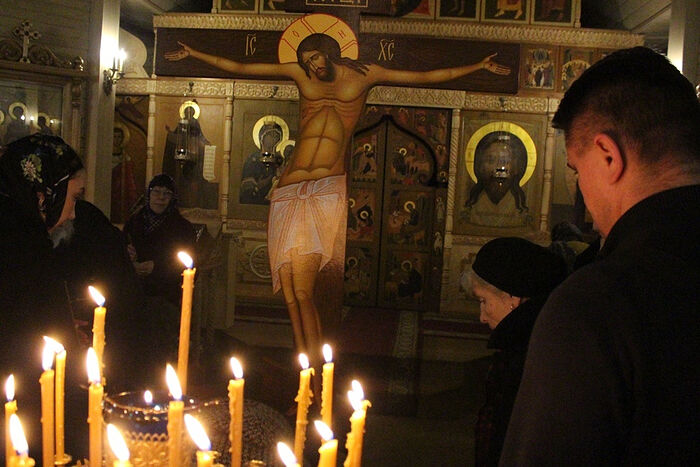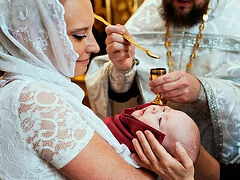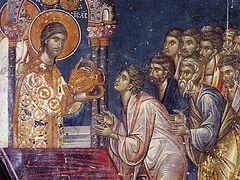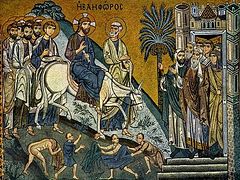Teaching 2
What shall I render unto the Lord for all that He hath rendered unto me? asked David, who once sought after the benefits of God; and he answered: I will take the cup of salvation, and I will call upon the name of the Lord (Ps. 115:3-4). No matter how great God’s benefits to David, they are small in comparison with the mercy that all of us, brethren, have been vouchsafed by the Lord. For the Lord has given us that which is above all blessings: He has given us Himself—His Body and Blood. What shall we render to the Lord for all that He has given us? Let us render at least that which David rendered: Having taken the cup of the Lord, let us proclaim the name of God, Who is beneficent unto us. And how shall we proclaim His name? In word, for many of us standing here are called to the ministry of word, to preach the Gospel, but above all, by our deeds and life. Would people believe a beggar covered in sores and rags when he says that he was at the table of the king and was honored with his friendship? Will we be believed when we say that we communed of the Body and Blood of the Lord, if the old sores of the passions, the old rags of sin remain on us?
The Lord didn’t demand dignity from us, sitting down at His table. He paid no mind to our sin and impurity. He took us straight from the crossroads of the world—and perhaps some from the gates of hell. He relied only upon our future gratitude—that we, sought out by mercy, satiated beyond our dignity, pulled out of the abyss of evil, with this very excess of mercy might be stopped on the path of iniquity; that the cup of the covenant itself might be a pledge of fidelity for us, a protection from the passions, an inducement to love; that our lips, wet with His Blood, might no longer open to utter obscene words; that our hearts, imbued with the fire of Divine love, might not exude evil thoughts and the lusts of the injurious. Shall we, brethren, betray this Divine hope in us, this loving trust in us? Will we show that we have come to the holy table with the hypocrisy of the Jews? Do we want to be a testimony that hell is stronger over sinners than Heaven is? Will we give the Body and Blood of the Lord to His enemies—our passions and iniquities? May it not be, may it not be, may it not be! I have washed my feet; how shall I defile them? (Song of Sg. 5:3), exclaims the believing soul, depicted by Solomon. And it’s not just our feet that we have washed, but our hands and head as well. And with what did we wash? The most precious Blood of our Savior and Lord. To return, after all of this, to our former impurities means to shed the Blood of the covenant in vain, to upbraid the Spirit of grace, to abuse the sufferings of the Savior. Let all who have a need of it say so; let them say to the internal sea of the passions: You have come to such a state by my neglect; but from henceforth, by the grace of God, you shall go no further. Your waves will break in you!
Amen.
Teaching 3
In the book of Exodus we read that after the establishment of the covenant between God and the people of Israel, as a sign of which all the people were sprinkled with the blood of the sacrifice, Moses took the book of the covenant, and read in the audience of the people: and they said, All that the LORD hath said will we do, and be obedient (Ex. 24:7).
It’s not necessary to repeat now for you, brethren, the book of the New Testament, from the chalice of which you have drank the Blood of the Lord; for this Divine book was opened many times before you in the preceding days. Therefore, something akin to what the establisher of the New Testament Himself said about the first communicants of His Body and Blood can be said of you: The way ye know (Jn. 14:4). You know where the path lies because of the Mystical Supper; you know what the Lord wants to teach us and what He demands of us, feeding us with Himself; you understand that through this, He wants to be in us and unite us to Himself, and that this mystical union is possible on our part through faith and love alone.
If ye know these things, happy are ye if ye do them (Jn. 13:17). The New Testament has no need of the works of the Law, but it certainly demands works of grace. Without this, the Testament remains new, and we remain old. The Blood of the Covenant, of which we partake, cannot remain silent: It cries out either for us, for the remission of sins (Mt. 26:28), or against us, for revenge for sins.
If ye know these things, happy are ye if ye do them (Jn. 13:17). You are blessed, for in this case you are Christ’s, and Christ is yours, and with Him all are yours (1 Cor. 3:22): Heaven and Earth, time and eternity. You are blessed, for sooner or later, He will come to us, and gather us to Himself, so that we, His servants, might be ever there where He, our Lord and leader, is. But all of this is under the condition: If ye do. If we live and walk as He lived and walked, if we love and proclaim the truth and virtue as He loved and proclaimed them, if we bear our cross and overcome the world as He bore it and overcame it, if we are like Him, then we are faithful even unto death.
Otherwise, brethren, this Divine meat commendeth us not to God! (1 Cor. 8:8).
Amen.





